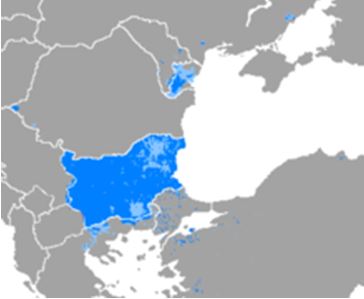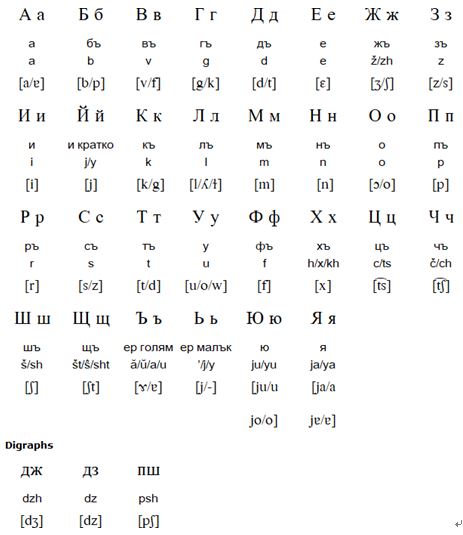Bulgarian Translation

Target Language Translation Services specializes in certified and standard translation between Bulgarian and English using only native speaking Bulgarian and English linguists, who work in a variety of specialist fields. Our linguists also have a deep understanding of culture and customs of Bulgarian-speaking countries. We have a strict vetting and quality control process to ensure our high standards are met by all of our Bulgarian linguists allowing us to consistently deliver quality work to our customers.

The Bulgarian-speaking world:
regions where Bulgarian is the language of the majority
regions where Bulgarian is the language of a significant minority
Introduction of Bulgarian
Bulgarian is a Southern Slavic language with about 12 million speakers mainly in Bulgaria, but also in Ukraine, Macedonia, Serbia, Turkey, Greece, Romania, Canada, USA, Australia, Germany and Spain. Bulgarian is mutually intelligible with Macedonian, and fairly closely related to Serbian, Croatian, Bosnian and Slovenian.
Bulgarian was the first Slavic language to be written: it start to appear in writing during the 9th century in the Glagolitic alphabet, which was gradually replaced by an early version of the Cyrillic alphabet over the following centuries.
At the end of the 18th century the Russian version of Cyrillic or the "civil script" of Peter the Great (1672-1725) was adapated to write Bulgarian as a result of the influence of printed books from Russia. During the 19th century a number of versions of this alphabet containing between 28 and 44 letters were used. In the 1870s a version of the alphabet with 32 letters proposed by Marin Drinov became widely used. This version remained in use until the orthographic reform of 1945 when the letters yat (Ѣ ѣ), and yus (Ѫ ѫ) were removed from the alphabet.
A modern literary language based on vernacular spoken Bulgarian was standardised after Bulgaria became independent in 1878. Many Turkish words were adopted into Bulgarian during the long period of Ottoman rule. Words have also been borrowed from Latin, Greek, Russian, French, Italian, German and increasingly from English.
Bulgarian alphabet (българска азбука)

Dialects
Contemporary Standard Bulgarian is the official variant of the language. The Palityan dialect is functionally intelligible with Standard Bulgarian (Ethnologue).The Pomak dialect spoken in Greece is a transitional dialect between Bulgarian and Serbian.
Structure
Sound system
The sound system of Bulgarian shares many of its features with other Slavic languages.
Vowels
Bulgarian has six vowels. Unstressed vowels tend to be shorter than their stressed counterparts.
Bulgarian (/bʌlˈɡɛəriən/ ( listen), /bʊlˈ-/ bu(u)l-GAIR-ee-ən; български, bǎlgarski, pronounced [ˈbɤɫɡɐrski] ( listen)) is a South Slavic language spoken in Southeastern Europe, primarily in Bulgaria. It is the language of Bulgarians.
Along with the closely related Macedonian language (collectively forming the East South Slavic languages), it is a member of the Balkan sprachbund and South Slavic dialect continuum of the Indo-European language family. The two languages have several characteristics that set them apart from all other Slavic languages: changes include the elimination of case declension, the development of a suffixed definite article and the lack of a verb infinitive, but it retains and has further developed the Proto-Slavic verb system (albeit analytically). One such major development is the innovation of evidential verb forms to encode for the source of information: witnessed, inferred, or reported.
It is the official language of Bulgaria, and since 2007 has been among the official languages of the European Union. It is also spoken by minorities in several other countries.
|
Front |
Central |
Back |
|
|
Close |
I |
U |
|
|
Mid |
e |
ə |
O |
|
Open |
a |
/ə/ = a in about
Consonants
A distinguishing feature of Bulgarian consonants is that many of them can be either unpalatalized (hard) or palatalized (soft). This distinction makes a difference in word meaning. Palatalization refers to a secondary articulation whereby the body of the tongue is raised toward the hard palate during the articulation of the consonant. In writing, palatalization is indicated by the letters и, е, я, ю written after the consonant. Like all Slavic languages, Bulgarian allows a variety of consonant clusters.
Below is a table of Bulgarian consonant phonemes, i.e., sounds that make a difference in word meaning. The English approximations of the consonants are also indicated.
|
Bilabial |
Labio- dental |
Alveolar |
Alveo- palatal |
Velar |
||
|
Stops |
voiceless |
p |
t |
k |
||
|
voiced |
b |
d |
g |
|||
|
Fricatives |
voiceless |
f |
s |
ʃ |
x |
|
|
voiced |
v |
z |
ʒ |
|||
|
Affricates |
voiceless |
ts |
tʃ |
|||
|
voiced |
dz |
|||||
|
Nasals |
m |
n |
||||
|
Laterals |
l |
|||||
|
Trill |
r |
|||||
|
Approximants |
j |
• /x/ = ch in Loch
• /ʃ/ =sh in shape
• /ʒ/ = s in measure
• /tʃ/ = ch in chat
• /dʒ/ = j in jet
• /r/ has no equivalent in American English
• /j/ = y in yet
Stress
Stress can fall on any syllable in the word.
Grammar
During the Middle Bulgarian period (12th-15th centuries), while Bulgaria was part of the Ottoman Empire, the language underwent significant changes. Among them were the loss of the Old Church Slavonic case system, preservation of the complex Old Church Slavonic tense-based verb system (most other Slavic languages simplified the system), and the development of a suffixed definite article (absent in all other Slavic languages). It is thought that these developments resulted from the influence of Turkish, the official language of the Ottoman Empire, as well as of other Balkan languages.
Nouns
Nouns, adjectives and pronouns are marked for the following categories:
• Gender: masculine, feminine, and neuter.
• Number: singular and plural, with some vestiges of the dual number.
• The accusative of animate nouns is marked.
• Definiteness is expressed by a definite article attached as a suffix to the first stressed noun of the noun phrase, e.g., чoвeк ‘man’ and чoвeкът ‘the man’, жeнa ‘woman’ and жeнaтa ‘the woman.’
• Adjectives agree with the nouns they modify in gender, number, and case.
Verbs
The Bulgarian verb system has preserved many features of Old Slavic, particularly the complex tense system. Verbs are marked for the following categories:
• Person: 1st, 2nd, 3rd
• Number: singular, plural
• Present, past, future tenses are expressed in a number of simple, compound, and hybrid forms.
• Aspect: imperfective and perfective; perfective verbs are formed by prefixation, and most verbs form aspectual pairs, e.g., чeтa ‘read’ (imperfective) and пpoчeтa ‘read’ (perfective).
• Mood: indicative, imperative, conditional, subjunctive, renarrative; the renarrative mood is used to convey information about doubtful or nonwitnessed events.
• Unlike other Slavic languages, Bulgarian does not have an ending for the infinitive. Instead, like English, it marks the infinitive with дa ‘to,’ e.g.,иcкaм дa чeтa ‘I want to read’
Word order
The neutral word order in Bulgarian is Subject-Verb-Object. However, other orders are possible. Word order is principally determined by topic (what the sentence is about, or old information) and focus (new information). Constituents with old information precede constituents with new information, or those that carry most emphasis. This is typical of all Slavic languages.
Vocabulary
Up to two-thirds of the modern Bulgarian lexicon is based on common Slavic roots shared by the other Slavic languages. The rest of the words were borrowed from other languages, mostly from Greek and Latin, and to a lesser extent from French and Russian. Many loanwords from Turkish, Arabic, and Persian that entered Bulgarian during the long period of Ottoman rule have been replaced by their Slavic equivalents or by borrowings from other languages. In recent years, English has become the main source of borrowing.
Below are a few common phrases in Bulgarian.
Hello. Здpaвeй
Good bye Дoвиждaнe
Please Мoля
Thank you Блaгoдapя
Excuse me Извинете, извините ме, извинявам се.
Yes Дa
No He
Man Чoвeк
Woman Жeнa
Below are the numerals 1-10 in Bulgarian.
1 Eдно
2 два
3 тpи
4 чeтиpи
5 пeт
6 шecт
7 ceдeм
8 oceм
9 дeвeт
10 дeceт
Writing
In 886 AD, Bulgaria adopted the Glagolitic alphabet devised by the Byzantine missionaries Saint Cyril and Saint Methodius in the 850s. The Glagolitic alphabet was gradually replaced in the following centuries by the Cyrillic alphabet developed in the beginning of the 10th century. It was modeled primarily on the Greek alphabet with some letters borrowed from the earlier Glagolitic alphabet. At the end of the 18th century, it was replaced by the Russian ‘civil’ orthography, the result of the efforts of Peter the Great, czar of Russia, to modernize all aspects of Russian society, including orthography. In the late 1800s, an alphabet consisting of 32 letters designed by Marin Drinov gained acceptance. It was used until 1945, when another orthographic reform resulted in the current Bulgarian alphabet which has 30 letters. This latest version of the Bulgarian alphabet is given below.
А а Б б В в Г г Д д Е е Ж ж З з И и Й й К к Л л М м Н н О о П п Р р С с Т т У у
Ф ф Х х Ц ц Ч ч Ш ш Щ щ Ъ ъ ь Ю ю Я я
Just contact us to get more information and a no-obligation quote. Our project managers can be reached via telephone, email, or the form. We look forward to serving you.
For more information about Bulgarian translation,
call us or add wechat today at +86-13616034782
or send us an email to:info@target-trans.com